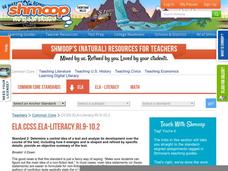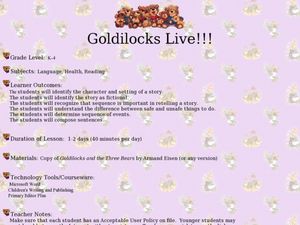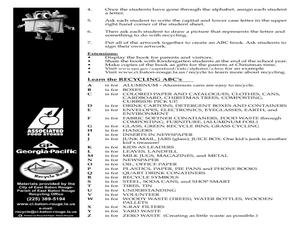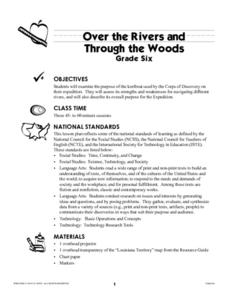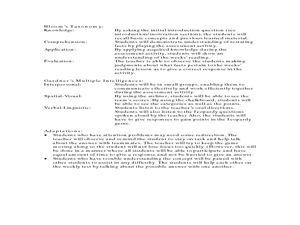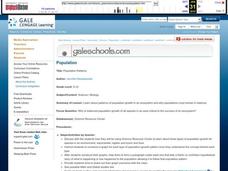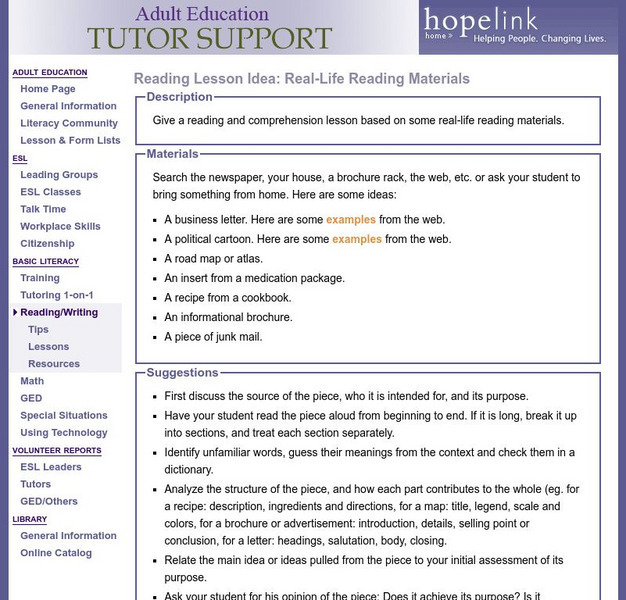Monterey Bay Aquarium
What's in a Name?
Combine art and word analysis in a lesson about genus and species. Elementary children sleuth out the meaning of scientific names for a number of shark species using a prefix and suffix definition chart. They then draw an image of the...
Curated OER
Introducing Biographies - Getting to Know You
Learners explore several different types of biographies to determine their area of interest, choose one notable person they would like to explore, complete online tutorial on biographies, and use written and Internet resources to...
Schmoop
ELA.CCSS.ELA-Literacy.RI.9-10.2
Although the ideas on how to implement the skill RI.9-10.2 are lacking, the assessment would work well for challenging learners to summarize, and identify the main ideas of presidential speeches that are of similar topics. One could use...
Curated OER
Goldilocks Live!!!
Study story elements with your young learners. Read Goldilocks and the Three Bears and discuss the order of events by making a story panel out of butcher paper. Sentences are given as suggestions for the panel, though you may compose...
Curated OER
Asking Research Questions
Using discoveries and inventions as the focus, learners complete a research project. First, they come up with research questions. Then, they conduct research on the topic. Finally, they write a research paper.
Curated OER
The Recycle Alphabet
First graders recognize words associated with recycling. In this environmental lesson, 1st graders go through the alphabet and think of words associated with recycling that start with a letter. Students create a recycling ABC book.
Curated OER
Gray Whales
Explore the majestic grey whale while deepening your understanding of animal adaptations. Grey whales from head to toe are specifically designed to fit their environment. Learners will examine the ways in which the flippers, head, body,...
Curated OER
Inventors & Trailblazers
Students are introduced to a groups of African American inventors. In groups, they research the role of each person in improving different industries. They also examine the barriers African Americans faced from the Civil War to the...
Curated OER
Library Curriculum: What Would a Wonderful Library Be Like?
Second graders complete a KWL chart about libraries. They create a book using writing patterns of a particular author. Students decide criteria for awarding the Second Grade Librarian Award to books in the classroom library, and use a...
Curated OER
Over the Rivers and Through the Woods
Sixth graders examine the purpose of the keelboat used by the Corps of Discovery on the Lewis and Clark expedition. They assess its strengths and weaknesses for navigating different rivers, and describe its overall purpose for the...
Curated OER
Chameleons Are Cool!
Have your learners review what they know about camouflage using this lesson. Learners fill out a graphic organizer listing what they know or have questions about. This could be enhanced with the addition of a writing assignment in which...
Curated OER
Parts of a Book
Second graders learn to identify the parts of a book. In this book parts instructional activity, 2nd graders learn the names of book parts by participating in a teacher led instructional activity in which they look at transparencies....
Curated OER
A Feat of Daring with Lewis and Clark Jeopardy
Sixth graders discover the exploration of the United States by participating in a class activity. For this U.S. History lesson, 6th graders research the Lewis and Clark expedition and participate in a game of Jeopardy based on the two...
Curated OER
Population Patterns
Students study patterns of population growth in an ecosystem and why populations must remain in balance. They interpret basic population graphs and suggest scenarios about different population growth patterns in an ecosystem.
Curated OER
Adventures in Alice
Students create a haiku and illustrate it on the computer. In this haiku lesson plan, students review the history of the haiku while they are outside and then write their own. Students then use a computer program to illustrate their poem.
Curated OER
Note-Taking
Students take notes and summarize information. In this communication lesson, students summarize information by taking notes using the various methods that their instructor presents to them.
Curated OER
How Logical is Garfield?
Third graders analyze comics found in the newspaper for samples of logical, emotional, and ethical appeal. They write a paragraph for each selected comic strip explaining how the comic strip represents the use of logic, emotions, or ethics.
Curated OER
Karst Topography
Students observe a movie about karst topography over the Internet and note nonpoint source pollution. They discuss ways to manage pollution and their experiences with any polltion sources.
Curated OER
Identify Virginia Native Animals
Young scholars practice using an online encyclopedia to research native animals to Virginia. Using the information from the encyclopedia, they identify the main and supporting ideas. They share their information with the class using...
Curated OER
Postcards from the Past
Students create postcards from the past by summarizing a historical event. Then they design illustrations for their postcards and send them off to another teacher at their school.
Curated OER
A View of Yourself Through Famous Writers
Learners research famous quotes and discover one that describes themselves. They consider topics such as family and hobbies that will help others understand them. They present their information to the class.
Curated OER
Making a Karst Dictionary
Students practice using the correct vocabulary in geology and hydrology. They use the Internet to research topics and practice their researching skills.
National First Ladies' Library
States' Rights: 1798-1860
Students develop an annotated timeline specific to the concept of States' Rights. They research an example to the doctrine noting how the ideas change and beome more specific as time passes and discuss their findings through class...
Hopelink
Hopelink: Reading Lesson Idea: Real Life Reading Materials
The purpose of this reading instructional activity is to offer a reading and comprehension instructional activity based on real-life reading materials. This gives students the opportunity to gain reading comprehension skills from...




